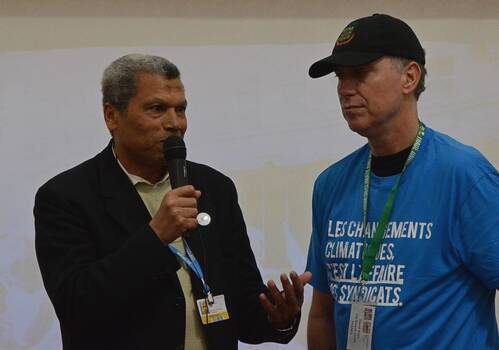
December 3, 2015 | 1:30-2:30 pm | Civil Society Space "Climate Generations" / World of Work Pavilion, Le Bourget, Stand A25
Discussions surrounding the phasing out of fossil fuels often describe fracking as a bridge technology. However, in Robert Howarth's view, professor for Ecology and Environmental Biology at Cornell University, 'this is definitely not a good idea'. Unlike conventional gas, which forms a large 'bubble' underground, fracking involves injecting chemicals and sand under high pressure into deep-rock formations to extract natural gas. This has had disastrous consequences. Fracking widely contaminates water, which can lead to severe impacts on health. Earthquakes are also a regular problem. Most importantly, though, and the main reason why fracking is an issue in Paris, is the fact that the large quantities of escaping methane means the technology has a far stronger impact on the climate than conventional gas production. This makes shale gas energy production even more harmful to the climate than coal.
Wrong metaphor of a 'bridge technology'
Howarth criticised that climate researchers predominantly focus on CO2, in spite of methane posing a far greater climate risk than carbon dioxide. Over the course of the last three years, around 35 studies have looked into fracking-related methane releases. They have come to very different conclusions. Whereas some of the studies conclude that fracking produces less methane than the production of conventional natural gas, others point to greatly increased methane emissions. According to Howarth, the latter studies are closer to the truth; he believes that studies showing that fracking leads to low levels of methane emissions are based on flawed measurements.
A simple fact highlights just how misleading the bridge technology metaphor really is. Even if we were to cut global greenhouse gas emissions to zero immediately, thirty years from now, the earth would still become 2°C warmer compared to pre-industrial levels. Seeing fracking as a bridge that allows us to smoothly transition into a climate-friendly post-fossil age is hence an utter illusion. In Paris, therefore, Howarth is stressing the need to end energy-sector methane emissions immediately.
How can we achieve this? The US state of New York proves the potential of unions to resist fracking. Judy Gonzalez from the New York State Nurses Association (NYSNA) recounted how a broad campaign succeeded in wresting a moratorium on fracking from the state. Unions took a two-pronged approach. On the one hand, they threw themselves into a campaign that directly targeted the governor; on the other hand, they increased awareness among the local population of the health risks associated with water contamination by fracking.
Fracking moratorium in New York State
The success of the campaign hinged on two aspects. Everybody understands the importance of water for life, Gonzales stated. People are shocked when they hear that each shale gas well wastes and contaminates seven million litres of water. Furthermore, nurses enjoy a great degree of trustworthiness, giving credibility to their warnings about the serious health hazards related to fracking. During the campaign, NYSNA campaigners dogged the governor at every public appearance. Eventually, the New York State Department of Health announced a moratorium on fracking.
Joaquin Turco from the Argentinian union Central de Trabajadores Argentinos (CTA - Autónoma) recounted a similarly successful struggle against fracking. Argentina possesses the world's second largest natural gas reserves. The country's first fracking well began production in 2012 in an area traditionally used for fruit cultivation. The workers were the first to rise against fracking. Soon, however, students, indigenous activists, and other groups became involved. Activists immediately situated the resistance against fracking within the context of struggles against mega-mining and agribusiness projects. According to Turco, this helped mobilise against fracking.
Nonetheless, the Argentinian government nearly instantly began a counter campaign. It commissioned studies to show the harmlessness and advantages of fracking. Shale gas, the government purported, could solve the energy crisis and become an alternative to oil. The state criminalised the activists. The movement, however, continued and was eventually successful. Since then, 50 towns in Argentina have designated themselves as 'fracking free zones'. 'The struggle against fracking and fossil fuel extraction also protects human lives, the environment and water in the name of future generations', says Turco. 'The planet will survive our current path, but our civilisation won't.'
Fracking does not create much jobs
Fracking is often portrayed as a jobs machine and the resistance against the technology needs to address this central pro-fracking argument. It is a false claim, says Sean Paddy from the union National Nurses United. The US - the country with the most extensive fracking industry and the longest experience - clearly proves that fracking does not increase employment. Figures for the Marcellus Shale in Pennsylvania, one of the largest fracking regions in the US, show that each well created only around 3.7 jobs. Only 0.13 per cent of all jobs in the region are fracking-related. Moreover, the claim that people migrate from jobs in oil production to fracking and then to the clean energy sector is demonstrably false. Fracking actually blocks the creation of new jobs in the renewables sector. As Paddy puts it: 'Each dollar invested in fossil fuels, is a dollar that is not being invested in renewables'.
In Tunisia, too, struggles against fracking are gaining first victories. Mansour Cherni, a Tunisian union representative, pointed out that thanks to the resistance of energy sector unions, the Tunisian government has backed out of a deal with Shell, which would have allowed fracking in the Kairouan region. However, now Total has appeared on the scene and aims to conclude new agreements. Recently, therefore, the general secretary of the Tunisian union UGTT Kacem Afaya, signed the global call for a moratorium on fracking. Representatives from the British campaign 'Frack Free South Yorkshire' and a Californian services union called on participants to ask their unions to be the next to sign the call for a moratorium. The moratorium would be the first step towards a global ban on fracking.